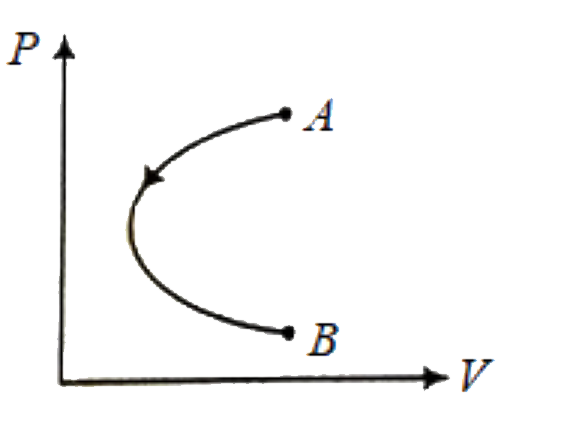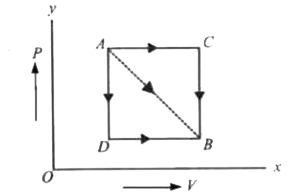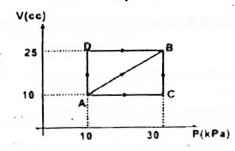For an ideal gas, consider only P-V work in going from an initial state X to the final state Z. The final state Z can be reached by either of the two paths shown in the figure. Which of the following choice(s) is(are) correct? [Take ΔS as change in entropy and w as work done]
![For an ideal gas, consider only P-V work in going from an initial state X to the final state Z. The final state Z can be reached by either of the two paths shown in the figure. Which of the following choice(s) is(are) correct? [Take DeltaS as change in entropy and w as work done]](https://d10lpgp6xz60nq.cloudfront.net/physics_images/NCERT_OBJ_FING_CHE_XI_C06_E02_003_Q01.png)
ΔSX→Z=ΔSX→Y+ΔSY→Z
wX→Z=wX→Y+wY→Z
wX→Y→Z≠wX→Y
ΔSX→Y→Z=ΔSX→Y
The correct Answer is:A
As ΔS does not depend on path and only depends on initial and final stages i.e., it is a state function thus
ΔSX→Z=ΔSX→Y+ΔSY→Z
and ΔSY→Z is not zero thus
ΔSX→Y→Z≠ΔSX→Y
As we know that work is not a state function and depends on path,
Thus, wX→Z≠wX→Z+wY→Z
wX→Y=PdV (P is constant)
wY→Z=0 (V is constant)
wX→Z=2.303nRTlog.V2V1
wX→Y→Z=wX→Y+wY→Z
As wY→Z=0, hence wX→Y→Z=wX→Y
Similar Questions
An ideal gas is taken from an initial state i to a final state f in such a way that the ratio of the pressure to the absolute temperature remains constant. What will be the work done by the gas ?
View SolutionP - V diagram of an ideal gas is shown. The gas undergoes from initial state A to final state B such that initial and final volumes are same. Select the correct alternative for given process AB.

View Solution
Knowledge Check
An ideal gas undergoes change in its state from the initial state I to the final state F via two possible paths as shown. Then
 Athere is no change in internal energy along path 1Bheat is not absorbed by the gas in both pathsCthe temperature of the gas first increases and then decreases for path 2Dwork done by the gas is larger in path 1.
Athere is no change in internal energy along path 1Bheat is not absorbed by the gas in both pathsCthe temperature of the gas first increases and then decreases for path 2Dwork done by the gas is larger in path 1.An ideal gas is taken from state A to state B following three different paths as shown in P-V diagram. Which one of the following is true ?
 Awork done is maximum along ABBwork done is minimum along ABCwork done along ACB = work done along ADBDwork done along ADB is minimum.
Awork done is maximum along ABBwork done is minimum along ABCwork done along ACB = work done along ADBDwork done along ADB is minimum.A system is changed from initial state to final state in such a manner that ΔH=q . If the same change from initial state to final state were made by different path , which of the following statements are correct?
AΔH remains the sameBΔH will depends upon the pathCHeat exchange will be same if the path is isobaricDHeat ecchanged q will be different if the path is non-iosbric.
Figure shows three paths through which a gas can be taken from the state A to the state B. Calculate the work done by the gas in each of the three paths.

View SolutionA system can be taken from the initial state p1,V1 to the final state p2,V2 by two different methods, let ΔQandΔW represent the heat given to the system and the work done by the system. Which of the following must be the same in both the method?
View SolutionP - V diagram of an ideal gas is shown. The gas undergoes from initial state A to final state B such that initial and final volumes are same. Select the correct alternative for given process AB.

View SolutionWhich of the following is correct in terms of increasing work done for the same initial and final state?
View SolutionA system can be taken from the initial state p1,V1 to the final state p2,V2 by two different methods, let ΔQandΔW represent the heat given to the system and the work done by the system. Which of the following must be the same in both the method?
View Solution
